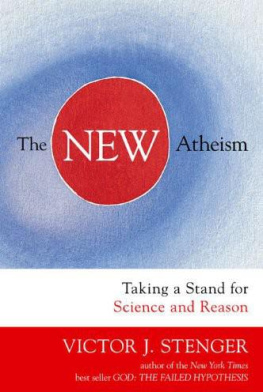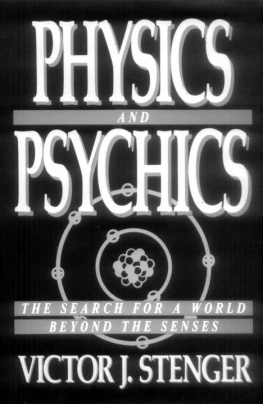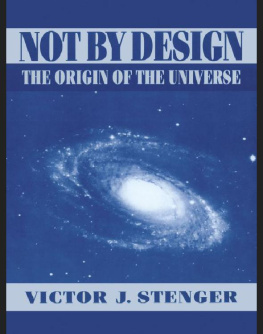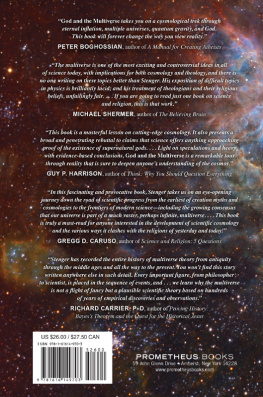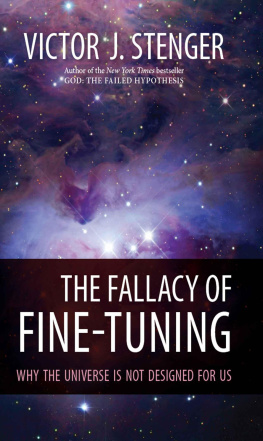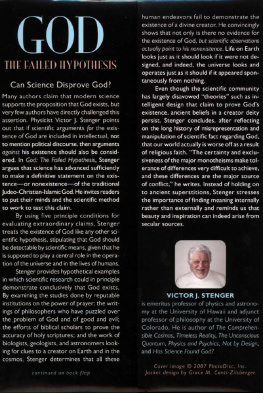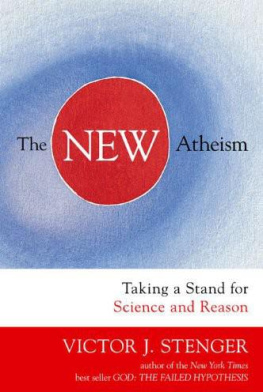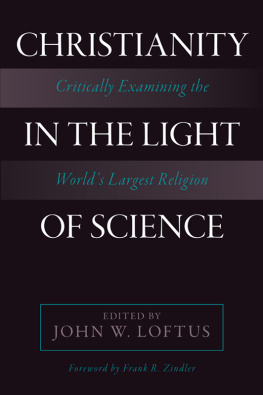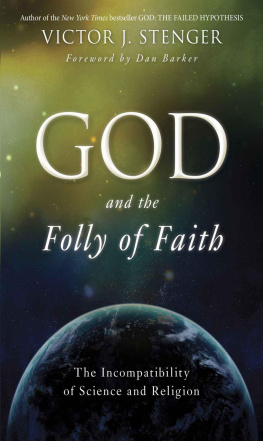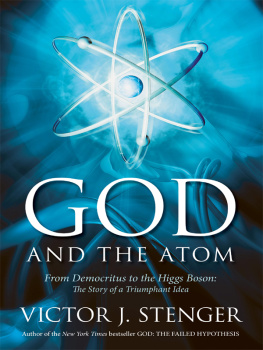ACKNOWLEDGMENTS
As in my other books, I have relied heavily on feedback from the e-mail discussion list avoid-L@hawaii.edu. I am especially grateful to Bob Zannelli for taking over the burden of managing this list for me as well as for his many helpful comments and suggestions on this manuscript. Thanks also to Lawrence Crowell, Yonatan Fishman, John Kole, Don McGee, Brent Meeker, Anne OReilly, Christopher Savage, Kerry Regier, and Taner Edis. And, as always, I could not function without the loving support of my wife, Phylliss, daughter, Noelle Green, son, Andy, son-in-law, Joe Green, and daughter-in-law, Helenna Nakama. And bringing the joy to my life that makes it all worthwhile are my grandchildren Katie Stenger, Lucy Green, Zoe Stenger, and Joey Green.
Finally, I need to acknowledge editor in chief, Steven L. Mitchell, and his excellent editorial and production staff, notably Joe Gramlich, Chris Kramer, and Grace Zilsberger, for their hard work and professionalism.
ABOUT THE AUTHOR
Victor J. Stenger grew up in a Catholic working-class neighborhood in Bayonne, New Jersey. His father was a Lithuanian immigrant, his mother the daughter of Hungarian immigrants. He attended public schools and received a bachelors of science degree in electrical engineering from Newark College of Engineering (now New Jersey Institute of Technology) in 1956. While at NCE, he was editor of the student newspaper and received several journalism awards.
Moving to Los Angeles on a Hughes Aircraft Company fellowship, Dr. Stenger received a masters of science degree in physics from UCLA in 1959 and a PhD in physics in 1963. He then took a position on the faculty of the University of Hawaii, retiring to Colorado in 2000. He currently is emeritus professor of physics at the University of Hawaii and adjunct professor of philosophy at the University of Colorado. Dr. Stenger is a fellow of the Committee for Skeptical Inquiry and a research fellow of the Center for Inquiry. Dr. Stenger has also held visiting positions on the faculties of the University of Heidelberg in Germany, Oxford in England (twice), and has been a visiting researcher at Rutherford Laboratory in England, the National Nuclear Physics Laboratory in Frascati, Italy, and the University of Florence in Italy.
His research career spanned the period of great progress in elementary particle physics that ultimately led to the current standard model. He participated in experiments that helped establish the properties of strange particles, quarks, gluons, and neutrinos. He also helped pioneer the emerging fields of very high-energy gamma-ray and neutrino astronomy. In his last project before retiring, Dr. Stenger collaborated on the underground experiment in Japan that in 1998 showed for the first time that the neutrino has mass. The Japanese leader of this experiment shared the 2002 Nobel Prize for this work.
Victor Stenger has had a parallel career as an author of critically well-received popular-level books that interface between physics and cosmology and philosophy, religion, and pseudoscience. These include: Not by Design: The Origin of the Universe (1988); Physics and Psychics: The Search for a World beyond the Senses (1990); The Unconscious Quantum: Metaphysics in Modern Physics and Cosmology (1995); Timeless Reality: Symmetry, Simplicity, and Multiple Universes (2000); Has Science Found God? The Latest Results in the Search for Purpose in the Universe (2003); The Comprehensible Cosmos: Where Do the Laws of Physics Come From? (2006); God: The Failed HypothesisHow Science Shows That God Does Not Exist (2007); and Quantum Gods: Creation, Chaos, and the Search for Cosmic Consciousness (2009). God: The Failed Hypothesis last made the New York Times Best Seller List in March 2007.
Dr. Stenger and his wife, Phylliss, have been happily married since 1962 and have two children and four grandchildren. They now live in Lafayette, Colorado. They attribute their long lives to the response of evolution to the human need for babysitters, a task they joyfully perform. Phylliss and Vic are avid doubles tennis players and generally enjoy the outdoor life in Colorado, and they travel the world as often as they can.
Dr. Stenger maintains a popular Web site (a thousand hits per month), where much of his writing can be found, at http://www.colorado.edu/philosophy/vstenger.
BIBLIOGRAPHY
Aikman, David. The Delusion of Disbelief: Why the New Atheism Is a Threat to Your Life, Liberty, and Pursuit of Happiness. Carol Stream, IL: Tyndale House, 2008.
Armstrong, Karen. The Great Transformation: The Beginning of Our Religious Traditions . New York: Anchor, 2007.
Arntz, William, Betsy Chasse, and Mark Vicente. What the Bleep Do We Know!? Discovering the Endless Possibilities for Altering Your Everyday Reality. Deerfield Beach, FL: Health Communications, 2005.
Aronson, Ronald. Living without God: New Directions for Atheists, Agnostics, Secularists, and the Undecided. Berkeley, CA: Counterpoint, 2008.
Atkatz, David. Quantum Cosmology for Pedestrians. American Journal of Physics 62 (1994): 619-27.
Atran, Scott. In Gods We Trust: The Evolutionary Landscape of Religion. Oxford: Oxford University Press, 2002.
Augustine, Keith. Hallucinatory Near-Death Experiences. http://www.infidels.org/library/modern/keith_augustine/HNDEs.html#experiments (accessed December 11, 2008).
Avalos, Hector. Fighting Words: The Origins of Religious Violence. Amherst, NY: Prometheus Books, 2005.
Azkoul, Michael. Anti-Christianity, the New Atheism. Montreal: Monastery Press, 1984.
Baars, Bernard J. The Conscious Access Hypothesis: Origins and Recent Evidence. TRENDS in Cognitive Sciences 6, no. 1 (2002): 47-62.
Barker, Dan. Godless: How an Evangelical Preacher Became One of Americas Leading Atheists. Berkeley, CA: Ulysses Press, 2008.
Barrau, Aurlian. Physics in the Multiverse. http://physicaplus.org.il/zope/home/en/1223032001/barrau_en/ (accessed June 5, 2009).
Barrow, John D., and Frank J. Tipler. The Anthropic Cosmological Principle. Oxford: Oxford University Press, 1988.
Bartholomew, David J. God, Chance, and Purpose: Can God Have It Both Ways? Cambridge: Cambridge University Press, 2008.
Beattie, Tina. The New Atheists: The Twilight of Reason and the War on Religion. Mary-knoll, NY: Orbis Books, 2007.
Beauregard, M., and V. Paquette. Neural Correlates of a Mystical Experience in Carmelite Nuns. Neuroscience Letters 405 (2006): 186-90.
Beauregard, M., V. Paquette, and J. Levesque. Dysfunction in the Neural Circuitry of Emotional Self-Regulation in Major Depressive Disorder. Neuroreport 17 (2006): 843-46.
Behe, Michael J. Darwins Black Box: The Biochemical Challenge to Evolution. New York: Free Press, 1996.
Benedict, Stephan Otto Horn, Siegfried Wiedenhofer, and Christoph von Schnborn. Creation and Evolution: A Conference with Pope Benedict XVI in Castel Gandolfo. San Francisco: Ignatius Press, 2008.
Benson, H., J. A. Dusek, J. B. Sherwood, P. Lam, C. F. Bethea, et al. Study of the Therapeutic Effects of Intercessory Prayer (Step) in Cardiac Bypass Patients: A Multicenter Randomized Trial of Uncertainty and Certainty of Receiving Intercessory Prayer. American Heart Journal 154, no. 4 (2007): 934-42.
Berlinski, David. The Devils Delusion: Atheism and Its Scientific Pretensions. New York: Crown Forum, 2008.
Beversluis, John. C. S. Lewis and the Search for Rational Religion. Amherst, NY: Prometheus Books, 2007.

